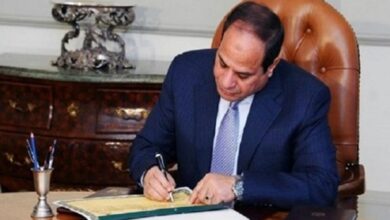Surrounded by nearly 200 young followers at an iftar gathering in Sayeda Zeinab Monday, opposition leader Mohamed ElBaradei repeated a warning that civil disobedience could be resorted to if the regime continues to ignore demands for reform.
“Civil disobedience is our last card in the peaceful process for change,” ElBaradei told members of the Popular Campaign to Support ElBaradei. “We do not want to resort to that, but we will not refrain from resorting to it if the regime doesn't respond to [our demands].”
The former head of the UN nuclear watchdog has emerged as a rallying figure for political reform in recent months. Thousands of young Egyptians and dozens of prominent opposition figures have thrown their full support behind his seven reform demands that include ending the state of emergency, amending the Constitution to allow for real multi-party presidential elections, ensuring judicial supervision of the vote, and putting an end to election fraud. Earlier, his campaigners threatened to strike if these demands go unheeded.
“We want to retrieve our freedom,” ElBaradei told his supporters at the iftar. “We want the people to rule themselves. We want the regime to be the people’s representative rather than custodian.”
ElBaradei’s supporters have been collecting signatures in favor of his petition in different Egyptian governorates through door-to-door canvassing and over the internet. So far the petition has attracted nearly 800,000 signatures.
Like most regime opponents, ElBaradei’s campaign is seeking to build a momentum for change ahead of the presidential elections slated for 2011. Although the leadership of the ruling National Democratic Party has confirmed that President Hosni Mubarak will be the party’s nominee, the incumbent’s ill-health raises doubts over his ability to run for a sixth term.
“The upcoming year and upcoming months will be decisive,” said ElBaradei. “A regime change may happen within months or a year.”
His defiant tone was met with fervent applause and whistles. His audience shouted: “Go ahead, Baradei, we are behind you to bring about change!” and “Oh, unjust regime, change is coming!”
“Today, ElBaradei’s speech was bolder than his previous ones,” 21-year-old Tanta University graduate Ahmed Abd Rabboh told Al-Masry Al-Youm on the sidelines of the iftar.
“This courage stems from the signatures that were collected and the popular support that he garnered over six months,” added Abd Rabboh.
Yet the signatures are not enough to convince ElBaradei to send his followers into the streets to further pressure the regime. The former diplomat warned the enthusiastic crowd against rushing and urged them to wait for “the right timing.”
“We should not take to the street until we know that such a move will mark the beginning of the end of this regime,” said ElBaradei.
Many of his supporters hailed ElBaradei’s warning as a wise approach. “Taking to the street is not a good option now. A confrontation with the regime may provoke a brutal reaction,” said 32-year old radiologist Dina Amin.
“We want him to take to the street with 50 or 60 thousand people to prove his strength to the regime. Up until now, not enough people would take to the street,” said Abd Rabboh.
ElBaradei also renewed a call for boycotting the upcoming parliamentary elections scheduled for November. He expects the poll to be marred by fraud since the government refuses to ensure full judicial inspection of balloting stations. ElBaradei said whoever participates in the poll, whether as a voter or a candidate, would be violating “the national will.”
Yet the Nobel Prize laureate’s call seems to have fallen on deaf ears, as most opposition parties, as well as ElBaradei’s Muslim Brotherhood allies, are all likely to field candidates for parliament.
“People have different views,” said ElBaradei. “I cannot impose my views on them. All I can do is [use] the power of persuasion.”




